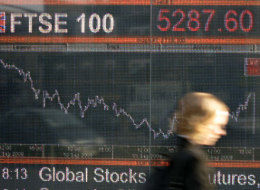The press has mostly been describing the current economic meltdown as a "credit crisis." Well, this is true, but the term is not particularly illuminating.
There are other terms which more clearly describe the current crisis:
-- rapid contraction of the money supply
--"run on the bank," where "bank" means all financial institutions all over the globe
--deflationary crisis
--deflationary death spiral
The last is fairly inflammatory, but may be the most accurate. We haven't seen deflation since the Great Depression.
The bit of economic data few seem to be recognizing is that ALL major items which can be purchased are falling in price, rapidly: stocks, real estate, commercial bonds, most commodities. The only things that don't seem to be falling rapidly are items that are considered essentially equivalent to currency: T-bills, gold, silver, the Japanese Yen, and the Swiss Franc. Even gold and silver aren't particularly strong.
If almost everything is falling in price, we have DEFLATION, by definition. Many will be slow to recognize the truth of this, because just a few months ago food and energy prices were increasing briskly. But crude oil prices are currently in a nosedive over the past week, and consumer price index data is pending for food.
What is a deflationary spiral all about? Loss of confidence in financial institutions results in increasing numbers of depositors closing accounts and converting balances to currency or the above dollar-equivalents.
From Wikipedia, entry for "deflation":
http://en.wikipedia.org/wiki/Deflation There have been three significant periods of deflation in the United States....
The third was between 1930-1933 when the rate of deflation was approximately 10 percent/year, part of America's slide into the Great Depression, where banks failed and unemployment peaked at 25%.
The deflation of the Great Depression, as in 1836, did not begin because of any sudden rise or surplus in output. It occurred because there was an enormous contraction of credit (money), bankruptcies creating an environment where cash was in frantic demand, and the Federal Reserve did not adequately accommodate that demand, so banks toppled one-by-one (because they were unable to meet the sudden demand for cash— see Fractional-reserve banking). From the standpoint of the Fisher equation (see above), there was a concomitant drop both in money supply (credit) and the velocity of money which was so profound that price deflation took hold despite the increases in money supply spurred by the Federal Reserve.
Sound familar? The similarities are very close. In both cases, the contraction came at the end of a speculative investment bubble that developed in the absence of effective, enforced regulations to prevent widespread fraudulent practices.
The biggest difference between 1930 - 1933 and 2008 is that the current economy is tied together with near-instantaneous communications. News events now cause changes of capital flows in minutes to hours, not weeks to months. This means that the development of new equilibrium of prices and money supply can happen much, much faster.
Reaching a new equilibrium much more quickly means that the pace of the contraction is accelerated and the time to "bottom" is quicker. It is entirely plausible that changes which took a decade to stabilize in the Great Depression might (MIGHT) now resolve over a period of months. There is today a much clearer understanding of the role of the money supply in these economic changes, and the Federal Reserve is now probably much more comfortable taking bold steps quickly.
Crucial to understanding the current disruption is a comprehension of the usual process of "money creation." Actual currency in circulation inexorably becomes the "support" for a much larger quantity of "money." Currency that is deposited in banks is lent out. The currency lent out is inevitably deposited again, only to be lent out again. Thus, a single $100 might "support" bank account balances totalling $1000. The bank balances these obligations with loans owed to them to balance their books. But the demand accounts entail a right of depositors to withdraw cash at any time. Loans can't generally be called in on demand. Similar processes apply to essentially any kind of "account" in which money is transferred in any way that could be deposited (or invested) elsewhere.
What happens when ten different depositors all want to simultaneously withdraw the same, single $100 bill that "supports" all this economic activity and wealth? In the absence of FDIC insurance, only the first-comer gets his money, the others find the establishment is out of business. Even with FDIC insurance, ony the first-comer gets his money right away--the others have to wait to be reimbursed.
This reality is both a cause and effect of money supply contraction. A demand to "cash out" accounts and investments and then hold onto cash (and cash-equivalents) means that the
ratio of currency to total wealth becomes larger. A monetarist would say that the "velocity of money" is decreased. If the amount of currency in circulation is not increased to accomodate the new ratio, wealth must necessarily decrease, as measured in dollar terms.
Consider that in a deflationary crisis, holding currency itself (e.g., cash in home safes or under mattresses) is the best investment available--these bills are increasing in value just by sitting there. All other asset classes are decreasing in value, as measured in appreciating dollars.
We can also view this deflationary process as a reversal of the money-creation process described above with the $100 that multiplies like the proverbial loves and fishes into $1,000 of wealth. In the electronic "information age," this process can reverse at very, very high speed. This is what we're witnessing this week.
Now, imagine a scenario in which the Bureau of the Mint has made a terrible mistake in printing of currency. All currency suddenly crumbles into dust. What happens to the economy? With no money in circulation, almost all economic activity stops or is replaced with barter or the like. How should this disaster be fixed? By putting new currency in circulation immediately. Fairness would dictate that the money should be distributed specifically to reimburse holders of crumbled bills. But the immediate problem of restoring economic activity will be corrected by any distribution approach that spreads these dollar bills widely. Economists speak hypothetically of dropping currency from helicopters. That would actually work in our current situation, but there are more advantageous methods of distribution.
Now, is the dollar really appreciating as fast as the stock market is falling? Almost certainly not. Banks, other financial institutions, and many businesses currently have an absolute requirement to obtain cash. With a contraction of the money supply and inexorable demands of customers to "cash out" accounts, many institutions have an absolute requirement to acquire more cash. Ordinarily, they could obtain short-term loans. But, one might note, such borrowing is currently grinding to a halt. Many, many institutions (and many individuals) have no choice but to raise cash by selling assets. When such a crisis develops quickly,
liquid assets are inevitably sold before less-liquid assets. Thus, changes in value of liquid assets are going to be faster and more dramatic than changes in price of, say, say real estate, or art work, or stamp collections, etc. Essentially, stocks are now being sold "at fire sale prices." We can expect less-liquid assets to fall in price more slowly and reach their new equilibrium before falling to such low prices.
Now, if stocks and corporate bonds are truly being sold at "fire sale prices," and if we can anticipate relatively quick restoration of adequate money supply by vigorous Federal Reserve action, what does that say about the future dollar value of these over-depreciated stocks?
Yeah, this is an exceptional buying opportunity for stocks, almost certainly. This is not to say that the market has reached its bottom. Its bottom will almost certainly occur in close proximity to the bottom of the money supply contraction. Probably the best daily measure of the pace of money supply contraction is the "TED-spread." (Well, the TED-spread reflects a number of different factors, but right now, as long as it remains at historically unprecedented highs, we can be quite sure that the money supply is contracting.) See:
TED-spread
http://www.bloomberg.com/apps/quote?ticker=.TEDSP:INDMy own hunch is that the market bottom will occur when the TED-spread reaches about 2.o. Maybe 1.0. But today, the spread appears to be at an all-time high, 4.64. Today, the money supply is probably contracting faster than ever before. This could change by Monday, though. Or not. It will change when the Federal Reserve pours currency into the economy faster than people are cashing out accounts and investments. The necessary action by the Fed is so far out of range of "normal" actions, that this institution might take weeks or months to gear up to actions of appropriate vigor.
If I were forced to guess the date of the stock market bottom and subsequent rally, I would suggest November 5. (Yes, the election. Markets hate uncertainty. The global economy would strongly prefer Obama, but I'd bet there'd still be a rally with a McCain victory.) With some ups and downs (of course) the Dow should be at 20,000 within 5 years, maybe 3. That's another wild guess. Don't sue me if the market stays in the doldrums for a decade.
Right now, I think it extremely prudent for the Federal Reserve and/or Treasury to start purchasing equity in stressed (but fundamentally sound) companies. The taxpayer will be buying low and will enventually be selling high. If the needed short-term monetary stimulus ends up causing an excessive growth in the money supply (as when all those home safes are emptied to put money back into real investments), the money supply can be quickly reigned in with the sale of those Fed-owned shares.
What should a wise individual do?
- ensure one is holding a generous supply of currency. (About the only stock to be buying is of companies that make and sell home safes.) The banks can literally run out of cash; ATMs could really stop dispensing cash.
-Don't blindly sell stock holdings. But some companies will fail in the current, deepening recession. You don't want to hold much in any individual company. Diversification is crucial.
-Diversification should be viewed very, very broadly. Not just stocks and bonds, but dollar-denominated assets should be balanced with a range of global investments in other currencies. Consider cash-in-hand as a part of a sound investment portfolio.
-Consider re-investing any substantial cash holdings into the stock market. Not necessarily right away, but soon. One could put, say, 2% of surplus cash holdings in the market each week. My suspicion is that the stock purchased over the next few weeks will be cheaper than subsequently, but nobody has a crystal ball.
-Don't have conniptions about news stories of the government dishing out vast amounts of money. Money HAS to be distributed for the crisis to end. But pumping lots of money into banks alone would be unjust. The poor, folks who have lost their jobs, and retirees who have lost so much of their holdings should get a share of this money. Remember, the restoration of economic activity right now requires that the federal government supply more currency. Only the federal government can supply more money. We actually have no problem with how spending needs are to be "paid for." There is an urgent need for the printing and distribution of more money. We actually need to have HUGE federal budget deficits for the next year or two. We currently have the luxury of funding these deficits with newly-printed money.
The truth of the last three sentences surely boggles many minds. For everyone's lifetime, big budget deficits have been considered irresponsible. How can they be necessary, or even prudent? In truth, if one can put aside preconceptions and conventional wisdom, the logic is inexorable.
A
deflationary crisis can only be reversed with massive
"inflationary" stimulus.







